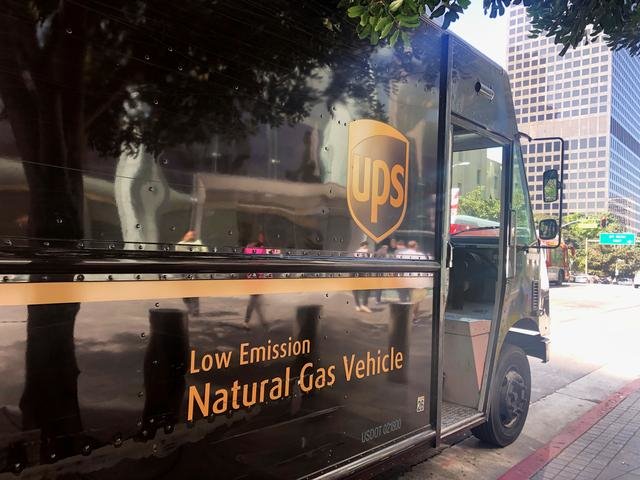
Starting next year, there will be a lot more "green" in those brown UPS delivery trucks.
United Parcel Service Inc announced plans to buy more than 6,000 natural gas-powered trucks over three years and step up purchases of renewable natural gas (RNG) as part of a new $450 million investment to reduce the environmental impact of its 123,000-vehicle fleet.
The latest move from the world's largest package delivery firm comes as utility companies, investors and others seek to expand the use of RNG - which is derived from decomposing organic matter such as cow manure on dairy farms, discarded food in landfills and human waste in water treatment plants - to reduce greenhouse gas emissions.
RNG and natural gas from fossil fuel are both methane and can be used interchangeably. Natural gas vehicles are less polluting than those that run on unleaded gasoline or diesel, but RNG has the added benefits of replacing fossil fuel and preventing naturally occurring methane - a powerful greenhouse gas - from being released into the environment.
UPS's latest effort "allows for seamless integration of a truly renewable, organic fuel source into the fleet," Mike Whitlatch, UPS's vice president of global energy and procurement, told Reuters.
UPS expects to use 31.9 million gasoline gallon equivalents (GGE) of RNG this year. As of this month, it has agreed to purchase 230 million GGE of RNG over the next seven years, a commitment that UPS says makes it the transportation industry's largest user of RNG.
"We provide one large-single user to help de-risk (RNG) projects," Whitlatch said of UPS. The Atlanta-based company's new vehicle purchases will begin next year and add to the roughly 10,000 alternative fuel or advanced technology delivery vehicles already in use by UPS.
Norway-based Hexagon Composites' Agility Fuel Solutions will equip UPS's new brown delivery trucks, semi trucks and terminal tractors to run on natural gas. UPS customer and rival Amazon.com Inc last month pledged to buy 100,000 electric delivery vehicles from startup Rivian Automotive LLC and have them all on the road by 2024. Amazon's independent delivery partners currently use about 30,000 conventional fuel vans.
UPS's fleet of planes and trucks created 14.6 million metric tonnes of CO2e, a standard unit for measuring carbon footprints, while moving 5.2 billion packages in 2018. Amazon, which has not yet released data on its carbon footprint, last month said it would be net carbon neutral by 2040.